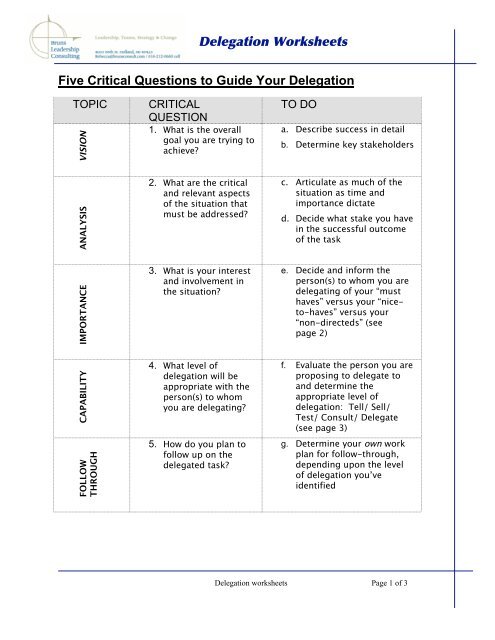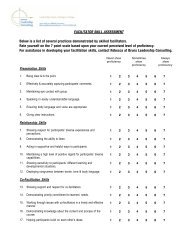Delegation Worksheets - Bruns Leadership Consulting
Delegation Worksheets - Bruns Leadership Consulting
Delegation Worksheets - Bruns Leadership Consulting
Create successful ePaper yourself
Turn your PDF publications into a flip-book with our unique Google optimized e-Paper software.
<strong>Delegation</strong> <strong>Worksheets</strong><br />
Five Critical Questions to Guide Your <strong>Delegation</strong><br />
TOPIC<br />
VISION<br />
CRITICAL<br />
QUESTION<br />
1. What is the overall<br />
goal you are trying to<br />
achieve?<br />
TO DO<br />
a. Describe success in detail<br />
b. Determine key stakeholders<br />
ANALYSIS<br />
2. What are the critical<br />
and relevant aspects<br />
of the situation that<br />
must be addressed?<br />
c. Articulate as much of the<br />
situation as time and<br />
importance dictate<br />
d. Decide what stake you have<br />
in the successful outcome<br />
of the task<br />
IMPORTANCE<br />
3. What is your interest<br />
and involvement in<br />
the situation?<br />
e. Decide and inform the<br />
person(s) to whom you are<br />
delegating of your “must<br />
haves” versus your “niceto-haves”<br />
versus your<br />
“non-directeds” (see<br />
page 2)<br />
CAPABILITY<br />
FOLLOW<br />
THROUGH<br />
4. What level of<br />
delegation will be<br />
appropriate with the<br />
person(s) to whom<br />
you are delegating?<br />
5. How do you plan to<br />
follow up on the<br />
delegated task?<br />
f. Evaluate the person you are<br />
proposing to delegate to<br />
and determine the<br />
appropriate level of<br />
delegation: Tell/ Sell/<br />
Test/ Consult/ Delegate<br />
(see page 3)<br />
g. Determine your own work<br />
plan for follow-through,<br />
depending upon the level<br />
of delegation you’ve<br />
identified<br />
<strong>Delegation</strong> worksheets Page 1 of 3
<strong>Delegation</strong> <strong>Worksheets</strong><br />
The Target <strong>Delegation</strong> Model<br />
1. List your “must haves” – these outcomes<br />
or ways the task is accomplished are nonnegotiable<br />
for whatever reason<br />
2. List your “nice-to-haves” – you care about<br />
these outcomes or ways the task is<br />
accomplished but you can allow some<br />
leeway to the person to whom you are<br />
delegating<br />
3. List your “non-directed” – these outcomes<br />
or ways the task is accomplished can be<br />
left entirely up to the person to whom you<br />
are delegating<br />
<strong>Delegation</strong> worksheets Page 2 of 3
<strong>Delegation</strong> <strong>Worksheets</strong><br />
<strong>Delegation</strong> Level Definitions<br />
Tell: Use when -<br />
• subordinates or team members are low ability or low willingness<br />
• you have no options yourself – it must be done a certain way<br />
• your “must have” target zone is nearly total<br />
• there is a very high cost of non-performance<br />
• there is low trust<br />
• you cannot tolerate surprises<br />
Sell: Use when –<br />
• subordinates or team members have moderate ability but low willingness<br />
• “buy-in” is very important to the outcome<br />
• your “must have” target zone is large<br />
• you have already decided on how the task should be performed,<br />
• there is a high cost of non-performance<br />
• you are beginning to build trust<br />
• you don’t want surprises<br />
Test: Use when –<br />
• subordinates or team members have ability and willingness<br />
• you have ideas but are open to other ideas and insights<br />
• you are open to being questioned<br />
• your “must have” target zone is moderate<br />
• there is trust developing<br />
• you don’t expect surprises<br />
Consult: Use when –<br />
• subordinates or team members have moderately high ability and willingness<br />
• you want subordinates to have high buy-in to the project or task<br />
• others might have innovative ideas or know more than you do<br />
• your “must have” target zone is quite small<br />
• you can define the vision and but need to know the “how”<br />
• there is high trust<br />
• you know there will be no surprises<br />
Delegate: Use when –<br />
• subordinates or team members are high ability and high willingness<br />
• your belief in your subordinates’ ability is high<br />
• you’re sure others have good ideas or know more than you do<br />
• you can delegate every aspect, your “must have” zone is nearly zero<br />
• you can define the vision and don’t need to know the “how”<br />
• there is very high trust<br />
• surprises are not an issue<br />
<strong>Delegation</strong> worksheets Page 3 of 3



